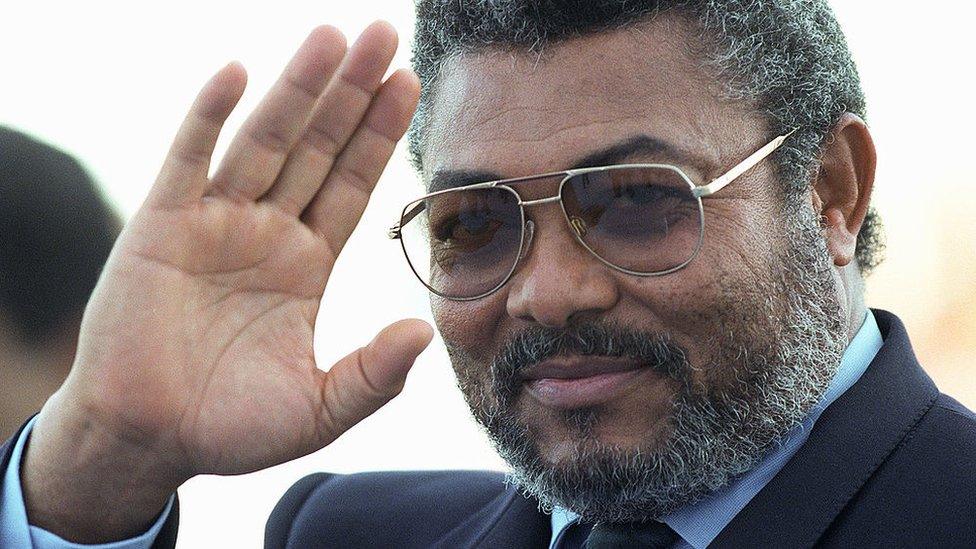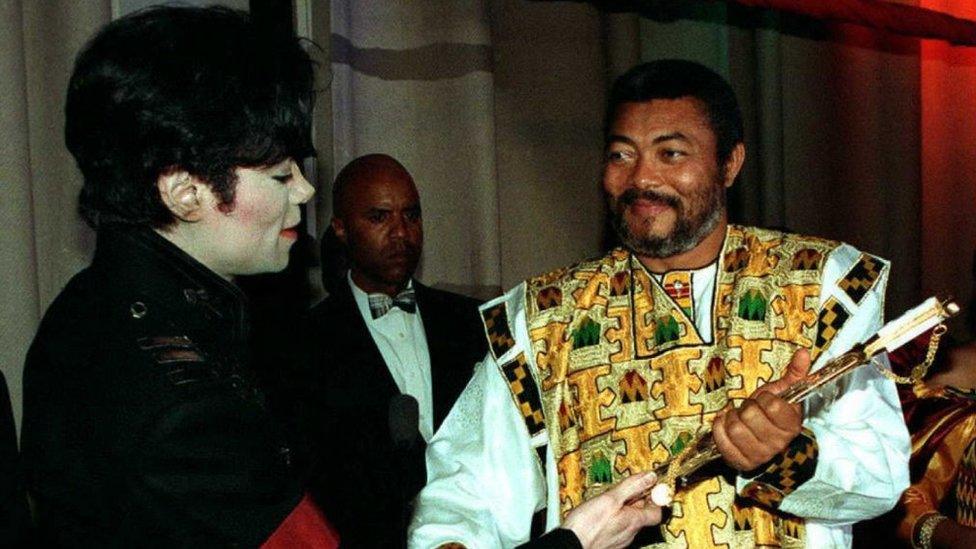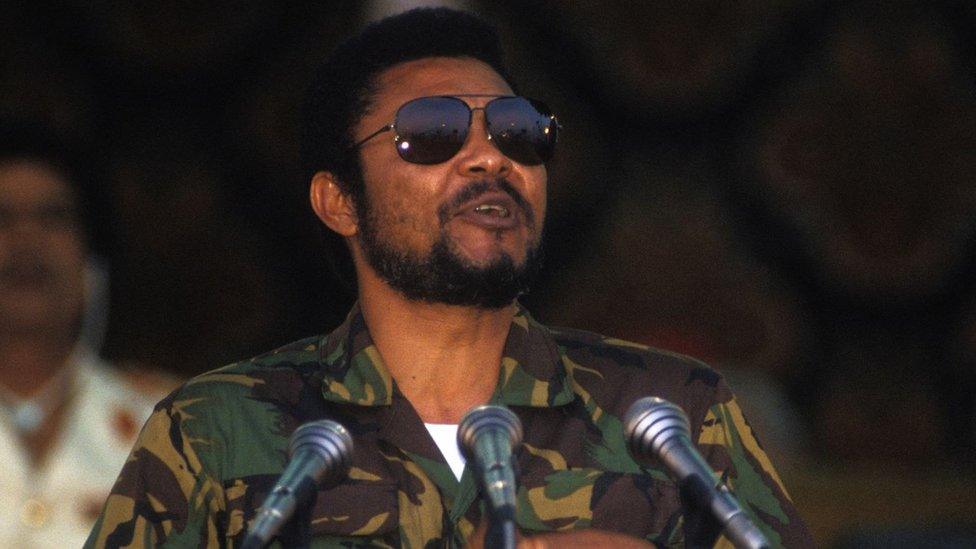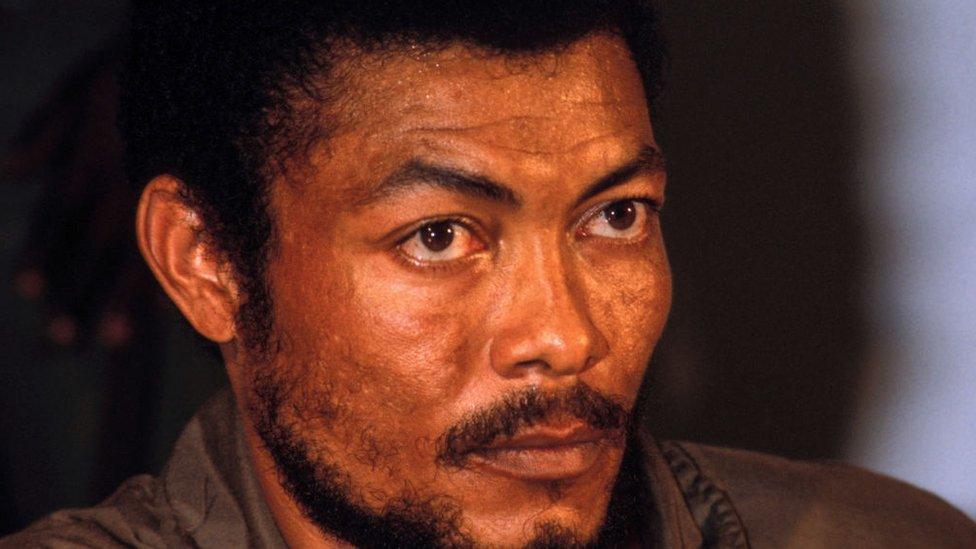Jerry Rawlings: Ghana's ex-president dies aged 73
- Published

Jerry Rawlings took power as a committed socialist, but later introduced free-market reforms
Ghana's former President Jerry John Rawlings has died at the age of 73.
He led two coups, first in 1979, before twice being elected president in multiparty polls.
A charismatic figure, he first seized power railing against corruption and was responsible for executing several former heads of state for their alleged graft and mismanagement.
He was also seen as a champion of the poor, but came to be criticised for alleged human rights abuses.
He died in hospital in the capital, Accra, after a short illness.
A week of national mourning has been announced in Ghana for the country's longest-serving leader, who oversaw the transition to multiparty elections in what is now one of Africa's most stable democracies.
John Mahama, presidential candidate of the National Democratic Congress (NDC), founded by Rawlings, has announced that he is suspending campaigning for next month's elections.
Who was Jerry Rawlings?
The son of a Scottish farmer and a Ghanaian mother, Rawlings entered the Ghana Air Force, graduating in 1969.
A decade later, as a senior officer in the air force, he overthrew a military government, handing over power to a civilian leader.
He oversaw the execution of several former heads of state and army generals for corruption, but expressed some regret about the killings. Later the execution by firing squad of Supreme Court judges also left a stain on his legacy.
"I am still aware that we in Ghana do not like bloodshed," he said at the time.
"I personally do not like it. I mean, I'd rather, let's say, confiscate a man's wealth and bring him down to the level to which he's brought us just to give him a taste of what life has been, what he's done to us."

Jerry Rawlings (right) and Michael Jackson
In 1981, he led a second coup and was the head of a military junta until introducing multi-party elections in 1992, when he was first elected president.
He stepped down in 2001 after serving two terms but continued to wield a strong influence in the country.
He began his time in power as a committed socialist, but later introduced free-market reforms.
He ushered in a long period of political stability after a tumultuous series of coups in the 1960s and 1970s.
In later years, Rawlings campaigned for African nations to have their international debts written off.
African leaders pay their tributes
Ghana's President Nana Akufo-Addo, who is from a rival political party, announced seven days of national mourning.
"A great tree has fallen, and Ghana is poorer for this loss," he said in a statement.
African Union Commission chairman Moussa Faki Mahamat said "Africa has lost a stalwart of Pan-Africanism and a charismatic continental statesman".
While Liberian President George Weah said "Ghana, Liberia and Africa will miss a great leader".
"Liberia remembers his immense contribution to the attainment and sustainment of peace during our dark days of our own history," he added in a tweet.
Allow X content?
This article contains content provided by X. We ask for your permission before anything is loaded, as they may be using cookies and other technologies. You may want to read X’s cookie policy, external and privacy policy, external before accepting. To view this content choose ‘accept and continue’.

Nigerian President Muhammadu Buhari said "the entire African continent will sorely miss the sterling qualities of the great leader".
"The passion, discipline and moral strength that the former Ghanaian leader employed to reposition his country over many years continue to reverberate across the continent and beyond," he said in a statement.

Remembering Jerry Rawlings
By Akwasi Sarpong, BBC News
Jerry John Rawlings got involved in national politics as Ghana was in the throes of food shortages and a dire economy that had led to rampant inflation. People remember him for leading by example.
I remember watching him on the daily evening newscast on black and white TV as a little boy.
Video clips showed a bare-chested officer in a military jumpsuit leading teams of volunteers hammering in nails and lifting timber planks into place to build rail tracks needed to cart cocoa beans from farms deep inland to the harbours to earn much-needed export revenue.
Huge crowds turned out to hear him chastise the political elite.

People would be spellbound as he gestured, swayed his body, growled, and sometimes joked while emphasising his key message of ending rife indiscipline and corruption.
"Probity, transparency and accountability" were buzzwords he used frequently to describe the standard he expected from public officeholders.
His critics argued that he fell short of these expectations. They accuse him of human rights abuses, including the execution of two former heads of state and army generals accused of economic sabotage, abuse of power to amass wealth and misuse of state funds.
Political opponents also accused his administration of being intolerant to dissent while human rights campaigners were outraged at the arrest and imprisonment of opposition leaders.

- Published12 November 2020
